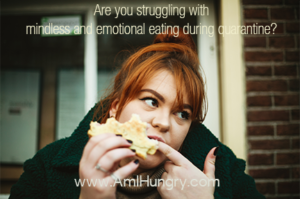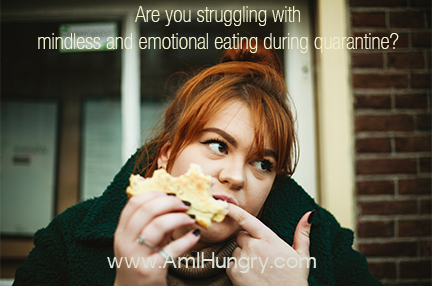If you find yourself struggling with mindless and emotional eating during quarantine, you are not alone! Here’s why and what to do about it.
First, what is mindless and emotional eating?
 You were born with the instinctive ability to manage your eating according to your body’s needs. But you are not a machine – and food is not just fuel!
You were born with the instinctive ability to manage your eating according to your body’s needs. But you are not a machine – and food is not just fuel!
You are also an emotional being. And you were born with the instinctive need to regulate your emotions too.
Throughout your life, you may have discovered that eating is a quick way to energize, calm, or distract yourself, even when you’re not hungry.
Now, during Coronavirus quarantine, emotions are high and food is nearby.
Add to that the tendency to “check out” and go on autopilot. Without noticing what is happening, you may be mindlessly snacking to manage your pandemic emotions.
Why you’re struggling with emotional eating during quarantine
If you were struggling with mindless and emotional eating before the pandemic, you’ve probably noticed it has become more of an issue during lockdown. These unprecedented circumstances have likely magnified many of the triggers you were already dealing with.
Here are some of the reasons you are struggling with emotional eating during the Coronavirus lockdown.
Eating adds pleasure
Food is a wonderful way to add pleasure to our lives. For many of us, food is a highlight of every holiday and special occasion. And there’s nothing wrong with that!
Now, due to the Coronavirus pandemic, we’ve had to curtail our activities, gatherings, vacations, and travel, so eating becomes the highlight of our day!
Eating fills a void
As our lives have become smaller, the ways we fill ourselves up have changed. Where previously we may have gone to classes, sporting events, concerts, or the mall, now our days sometimes blend together with less to look forward to.
Planning a meal or enjoying a snack seems to fill some of those voids temporarily.
And that’s the problem: It’s only temporary, so before long you find yourself standing in front of the refrigerator again.
Eating as a stress management tool
Stress is a common and normal experience these days. Confinement in close quarters, new work situations, loss of employment, home schooling your children, and Zoom burnout are just a sample of the stressors you may be facing these days. And that’s on top of the stress you had before Covid 19 hit!
Stress eating during quarantine is also common because it provides temporary (there’s that word again) relief and distraction.
Eating to ease anxiety
Some people are feeling anxious, but can’t quite put their finger on why. Of course, there is the fear of infection and illness, economic uncertainty, and racial and political strife.
But the loss of control and fear of the unknown are very common sources of anxiety.
Eating cures boredom
Yes, boredom is an emotion!
I learned about a Japanese word, kuchisabishii, that literally means “lonely mouth” or “longing to have or put something in one’s mouth.” Kuchisabishii seems to perfectly describe that strong urge to snack when you feel bored!
The cure for boredom is finding something to do. But your options may seem limited or more difficult to access during quarantine.
So, eating is something to do that easily cures boredom (temporarily!). And it tastes good, so it’s pleasurable too.
Food as a friend
The inability to freely connect in person with family, friends, co-workers—and even strangers, can lead to feeling isolated and lonely.
Eating can sometimes give you a false sense of connection, as if you are with a familiar friend.
Food is readily available
When you are working (playing, learning, etc.) from home, food is just steps away at all times. And, it seems to call to you from the kitchen, “I’m in here!” It’s so easy to reach for a snack when you feel bored or overwhelmed.
Food may seem scarce too
To limit our exposure to the virus, we’ve been advised to limit grocery shopping and dining out. So while food may be steps away, it can feel less available.
In addition, the privilege of eating out and enjoying great food you didn’t have to make requires almost as much effort as cooking these days!
This can lead to feelings of scarcity, a common trigger for eating.
Eating provides distraction
Perhaps if you only had to deal with one emotion at a time, it would be easier to cope. But I’m guessing you can relate to several of the examples I’ve described.
When these emotional triggers are piled one on top of the other, eating can become a distraction or an escape from the overwhelm.
What to do about emotional eating during quarantine
1. Begin with acceptance and self-compassion.
Accept that your feelings and behaviors are normal and understandable given our present circumstances. When you feel compassion for yourself, emotional eating is less likely to trigger guilt – another powerful emotional trigger for more eating!
When you become aware of emotional eating without shaming yourself, it creates an opportunity to learn more about yourself.
2. Tune into your natural signals of hunger and satiety.
If your schedule is more flexible than usual, take advantage of the opportunity to tune in to your signals of hunger and satiety to guide your eating.
When you feel like eating, pause and ask yourself, “Am I hungry?” (Review the symptoms of hunger here.)
Notice that I didn’t say, “If you’re not hungry, don’t eat.” That would turn mindful eating into another form of dieting, and you know how that turns out!
3. Become curious about your eating triggers and responses.
If you’re not hungry, it is likely that there is some other physical, environmental, or emotional trigger for eating.
Seize the opportunity to get curious about why you want to eat! You may even learn to decode your emotions so you can meet your needs in better ways than eating.
4. Eat what you love.
It may sound scary to give yourself permission to eat what you love. But restriction and deprivation only add to your stress and become powerful triggers for cravings, guilt, and emotional eating.
Get rid of guilt. Instead, set your intention to balance eating for nourishment with eating for enjoyment. You can fuel your body for the energy and nutrients it needs, while adding the necessary pleasure we are all craving these days. Which brings me to the next strategy…
5. Be intentional about eating for pleasure.
Sometimes you grab the food you’re craving, but then eat it mindlessly. When you eat fast or on autopilot, you miss out on the enjoyment you were hoping for. No wonder you find yourself craving more!
If you want to eat for pleasure, be intentional about it!
Mindfully prepare a favorite meal or try something brand new. Sit down to eat and give eating your full attention to create a multisensory experience.
Another tip: Eat with Beginner’s Mind – as if this is the first time you are tasting this particular food – because you are! Here’s a video from my Facebook Live video series about beginner’s mind. (Sorry about the audio/video mismatch; trying to find a solution for that – stay tuned!)
6. Expand your self-care skills.
The Coronavirus pandemic has been challenging, to say the least. But it has also provided an opportunity to shift and expand the ways we take care of ourselves.
In Eat What You Love, Love What You Eat, we call this the “self-care buffer zone.”
Self-care might entail practicing emotional coping skills, finding engaging ways to fill your time, learning something new, connecting virtually with friends and family members, or giving yourself permission to enjoy some downtime.
Self-care also means being willing to ask for help!
7. Seek additional support and guidance.
Give yourself a break! If you are struggling with mindless and emotional eating during quarantine, it probably isn’t a new problem.
Instead of feeling stuck and paralyzed, ask for help. What felt like a never-ending eat-repent-repeat cycle CAN be resolved with new skills and tools!
Here are a few ways you can get personalized help.
1. Mindful Eating Coaching.
Whether you’re new to Am I Hungry? or have participated in a mindful eating program or retreat, working with an Am I Hungry? Mindful Eating Coach will help you transform your life. Step-by-step, you and your coach will target the areas you struggle with and resolve them together. You’ll discover the barriers that are preventing you from eating mindfully and living vibrantly and explore solutions to overcome them. Read more.
2. Work with an Am I Hungry? trained dietitian/nutritionist or therapist.
We’ve trained and licensed hundreds of dietitian/nutritionists, therapists, and other health and wellness professionals to provide mindful eating programs for yo-yo dieting, binge eating, diabetes, and more. Click here to find someone in your area.
3. Mindful Eating Support Community.
Our engaged community members are working on healing their relationship with food and their body. In addition to all the support and tools included in the Community, Level 1 includes two private coaching sessions each month to guide you through the process. Learn more about our Support Community.
4. Private Mindful Eating Consultation with Michelle May.
During quarantine, Michelle is able to offer private consultations. She’ll meet with you privately via Zoom video (or phone) to hear where you are in journey and talk about obstacles, challenges, and questions you have in implementing mindful eating in your life. The session will provide reflection and insights based on Michelle’s 20 years of experience to help you overcome whatever challenges you are facing. Click here to register for the private consultation.
Enjoyed this article? Here are three more you might like:
Put the “weight gain during Coronavirus” memes in lockdown

